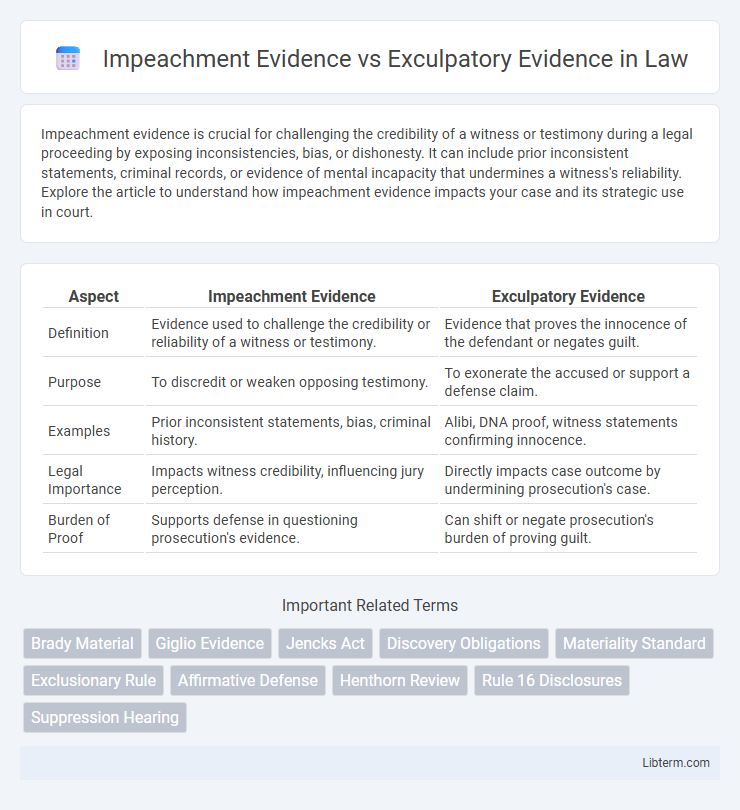Impeachment evidence is crucial for challenging the credibility of a witness or testimony during a legal proceeding by exposing inconsistencies, bias, or dishonesty. It can include prior inconsistent statements, criminal records, or evidence of mental incapacity that undermines a witness's reliability. Explore the article to understand how impeachment evidence impacts your case and its strategic use in court.
Table of Comparison
| Aspect | Impeachment Evidence | Exculpatory Evidence |
|---|---|---|
| Definition | Evidence used to challenge the credibility or reliability of a witness or testimony. | Evidence that proves the innocence of the defendant or negates guilt. |
| Purpose | To discredit or weaken opposing testimony. | To exonerate the accused or support a defense claim. |
| Examples | Prior inconsistent statements, bias, criminal history. | Alibi, DNA proof, witness statements confirming innocence. |
| Legal Importance | Impacts witness credibility, influencing jury perception. | Directly impacts case outcome by undermining prosecution's case. |
| Burden of Proof | Supports defense in questioning prosecution's evidence. | Can shift or negate prosecution's burden of proving guilt. |
Introduction: Understanding Impeachment and Exculpatory Evidence
Impeachment evidence refers to information used to challenge the credibility or reliability of a witness, aiming to undermine their testimony in a legal proceeding. Exculpatory evidence consists of facts or materials that can exonerate the defendant by proving innocence or reducing culpability. Distinguishing between impeachment and exculpatory evidence is crucial for ensuring a fair trial and accurate judgment.
Definitions: Impeachment Evidence vs Exculpatory Evidence
Impeachment evidence refers to information presented to challenge the credibility or reliability of a witness, aiming to weaken their testimony during a trial. Exculpatory evidence consists of any material or information that may prove the innocence of a defendant or reduce their culpability. Both types of evidence play crucial roles in the judicial process, influencing the outcome of trials by affecting witness credibility and the determination of guilt.
Legal Foundations: Rules Governing Both Evidence Types
Impeachment evidence challenges the credibility of a witness by exposing inconsistencies, bias, or dishonesty, primarily governed by the Federal Rules of Evidence (FRE) 608 and 609. Exculpatory evidence, which tends to prove a defendant's innocence or reduce culpability, is mandated for disclosure under the Brady v. Maryland ruling and related due process requirements. Both types of evidence are crucial for fair trials, with impeachment evidence impacting witness reliability and exculpatory evidence ensuring the prosecution's ethical obligation to disclose materially favorable information.
Key Differences: Purpose and Impact in Legal Proceedings
Impeachment evidence targets the credibility of a witness, aiming to challenge or discredit their testimony to weaken the opposing party's case. Exculpatory evidence provides information that can directly exonerate the defendant by proving innocence or casting reasonable doubt on guilt. While impeachment evidence affects the reliability of witness statements, exculpatory evidence impacts the overall determination of guilt or innocence in legal proceedings.
Roles in Criminal Trials: Prosecution and Defense Strategies
Impeachment evidence is used by the defense to challenge the credibility of prosecution witnesses, while exculpatory evidence can exonerate the defendant by proving their innocence or casting reasonable doubt. Prosecutors are obligated to disclose exculpatory evidence under Brady v. Maryland, ensuring a fair trial, whereas defense attorneys strategically employ impeachment evidence to weaken the prosecution's case. Both types of evidence play critical roles in shaping trial dynamics, influencing juror perception, and ultimately affecting the outcome of criminal proceedings.
Admissibility Standards: When Each Type is Allowed in Court
Impeachment evidence is admissible in court to challenge a witness's credibility, whereas exculpatory evidence must be disclosed and can exonerate a defendant by proving innocence. Courts apply relevance and materiality standards, allowing impeachment evidence if it directly impacts the witness's reliability, while exculpatory evidence meets a higher burden as it affects the outcome of the case. Federal Rules of Evidence and Brady v. Maryland mandate prosecutors to disclose exculpatory evidence, ensuring it is admitted to uphold due process.
Discoverability Obligations: Disclosure by Attorneys
Impeachment evidence, which undermines the credibility of a witness, must be disclosed by attorneys under discovery rules to ensure a fair trial. Exculpatory evidence, favorable to the defendant by potentially proving innocence, holds a constitutional requirement for disclosure under Brady v. Maryland. Both categories demand strict discoverability obligations to uphold due process and prevent wrongful convictions.
Case Examples: Impeachment vs Exculpatory Evidence in Action
In the landmark case of Brady v. Maryland, exculpatory evidence suppressed by the prosecution demonstrated the defendant's innocence, underscoring the critical role of such evidence in ensuring a fair trial. Contrastingly, impeachment evidence surfaced in United States v. Giglio, where undisclosed information about a witness's credibility impacted the outcome by challenging the reliability of testimony. These cases illustrate how impeachment evidence questions witness believability, whereas exculpatory evidence directly supports the defendant's innocence, both vital in criminal justice proceedings.
Challenges and Controversies: Disputes over Evidence Classification
Disputes over evidence classification arise because impeachment evidence, which challenges witness credibility, can blur lines with exculpatory evidence that directly favors the defendant's innocence. Courts often face challenges in determining the materiality and relevance of evidence, leading to controversies regarding disclosure obligations and the potential impact on trial fairness. These classification issues complicate legal strategies and raise significant concerns about defendants' constitutional rights under Brady v. Maryland.
Conclusion: The Importance of Proper Evidence Use in Justice
Proper use of impeachment evidence and exculpatory evidence is critical in ensuring justice is served accurately and fairly. Impeachment evidence challenges the credibility of witnesses, while exculpatory evidence can prove a defendant's innocence, both playing distinct yet complementary roles in legal proceedings. Misuse or withholding of either type can lead to wrongful convictions or acquittals, undermining the integrity of the justice system.
Impeachment Evidence Infographic

 libterm.com
libterm.com